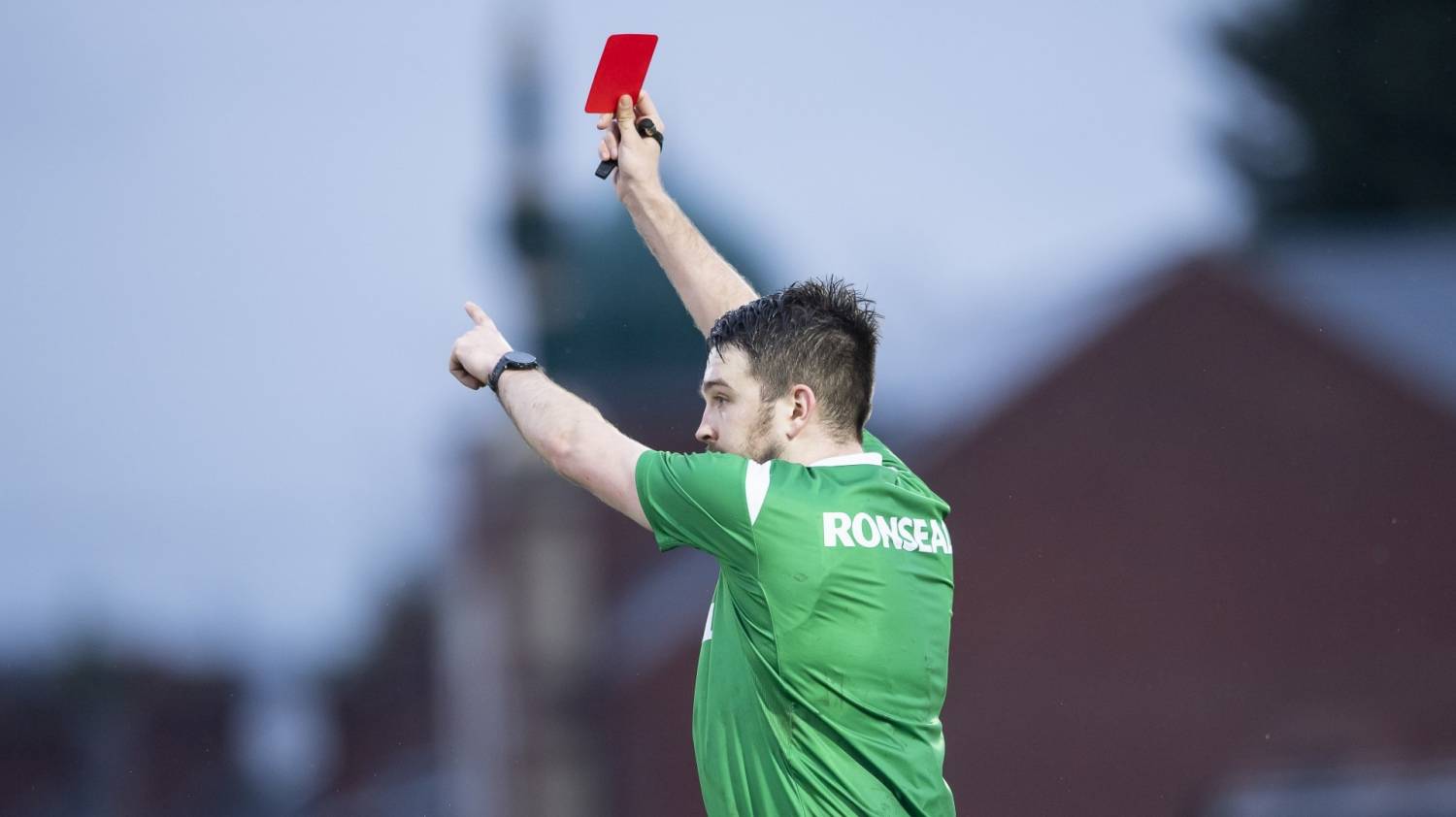7 Feb 2025
On-Field Sentencing Guidelines for 2025

The RFL Board this week approved amended On-Field Sentencing Guidelines for the 2025 season.
There are two significant changes to the Guidelines that were originally distributed to clubs in December, following feedback from clubs and consideration by the RFL’s Laws Committee on January 29.
First, players’ previous records up to the end of the 2024 season will be disregarded in the accumulation of penalty points – all players started 2025 on zero points. This is because it was considered unfair for players to be punished for offences committed in 2024 before the new guidelines were introduced.
Second, when an offence adds points to a player’s record that leads to the player receiving a sanction – either a fine or a suspension – the number of points added to their record for that offence will be reduced by 50%. This is to recognise that the player has previously served a sanction however there remains a percentage of points on the player’s record to acknowledge that they have committed previous misconduct.
With those amendments confirmed, the On-Field Sentencing Guidelines for 2025 were applied at a meeting of the Match Review Panel on Thursday February 6 considering incidents from last weekend’s fixtures in the Betfred Challenge Cup and the AB Sundecks 1895 Cup, as well as pre-season fixtures involving Betfred Super League clubs.
Background
Following the regular regulatory meetings with clubs at all levels in May 2024, the RFL was charged with devising new sentencing guidelines that would focus more on the punishment of repeat or serious offenders in terms of match suspensions.
The new guidelines were discussed at the RFL’s Laws Committee and approved by the RFL Board in December, then sent to clubs before Christmas – and have now been amended as explained above.
Detail (see attachment)
The new system sees the introduction of a points-based system, with suspensions to be incurred when players reach certain points thresholds – rather than as the result of the grading of each individual offence, as previously.
Offences will still be graded – now in five categories from A-E, rather than six from A-F as previously – and the two most serious categories, D and E, will still incur an immediate suspension.
But the principle underlying the changes is to reduce the number of players being suspended for relatively minor offences, unless they are consistent offenders in which case they will accumulate points beyond suspension thresholds.
Beginning on January 1, 2025, points will be accumulated over a 12-month period – and all points will remain on players’ records for 12 months, with the additional amendment regarding the halving of a penalty when it leads to a sanction applied as explained above.
The reduction from six grades to five is the logical extension of a decision taken ahead of the 2024 season to increase the threshold at which players are charged. Throughout 2024, the Match Review Panel operated a policy of charging players only for offences that would have merited on-field action by the match officials such as a sin-bin or dismissal – and as a result, only 12 Grade A charges were issued across Betfred Super League, Championship, League One, Women’s Super League and the Men’s and Women’s Challenge Cups – as opposed to 213 Grade B charges, and 142 Grade C charges.
It means that Grade B offences from 2024 will be ranked as Grade A offences in the new points system, with Grade C becoming Grade B, Grade D becoming Grade C, Grade E becoming Grade D, and Grade F becoming Grade E.
Grade A offences carry a one-point penalty, with three points for Grade B offences, five for Grade C and 12 for Grade D. Grade E offences still result in an immediate referral to an Operational Rules Tribunal, with a tariff to begin at a six-match suspension – although the points penalty will be determined by the Tribunal.
Players would be fined for any Grade A, B or C offence that left them with 5 points or fewer. Any offence that takes their points tally to between 6-11 points would result in a one-match suspension, with an additional fine if they have 9-11 points.
Reaching 12 points – the penalty for a single Grade D offence – will result in a two-match suspension, with an additional fine for 15-17 points, and a three-match suspension kicking in at 18 points.
There will be a fine in addition to a three-match ban when players reach 21-23 points, with a four-match ban from 24-29 points (and an additional fine for 27-29), a five-match ban for 30-35, a six-match ban for 36-38, a seven-match ban for 39-41, and bans increasing by one match for every three points from then on – with an automatic fine for any offence resulting in a player having a tally of 33 points or more.
Appeals / Operational Rules Tribunal
Players and their clubs will still have the right of appeal against any charge to an Operational Rules Tribunal. But the rules around unreasonable and/or frivolous challenges have been toughened up, meaning that any unsuccessful challenge to a charge of Grades A-D will automatically incur five penalty points to the player’s record.
Impact of dismissal / injury
One further significant change to the guidelines for 2025 is to reflect punishments imposed during matches in any charges subsequently imposed – along the same principle as a punishment of “sending off sufficient” used to be imposed.
A player charged with on-field misconduct who has been dismissed in the first half of a match will receive two points fewer on their record than the stipulated penalty for the charge – so a player dismissed for a Grade D offence in the first half of a match would receive 10 penalty points rather than 12.
Dismissal in the second half would mean a one-point readjustment.
In the unlikely event that a player does not have enough points on their disciplinary should points be removed (for example where a player with no previous points is dismissed in the first half and charged with a Grade A offence), their disciplinary record will restart at zero disciplinary points.
However the principle of players suffering additional punishment for offences that remove opposition players from the match remains – if the victim of a foul is removed from the field of play and unable to return because of charged misconduct, the transgressor will receive an additional three points on their disciplinary record – so a Grade D charge would carry 15 points rather than 12.
Pre-season / Reserves
Specific to pre-season fixtures, players will be able to count up to two of these fixtures towards any suspension.
Reserves fixtures will also count towards a ban in the rare circumstances of them occurring on a weekend when a club does not have a senior fixture.
SEE BELOW FOR NEW SYSTEM
NEW SANCTIONING PROCESS
Points allocation for each Charge Grade
GRADE
POINT ALLOCATION | |
A | 1 |
B | 3 |
C | 5 |
D | 12 |
E | Refer to Tribunal |
More points are given for grades which would be considered serious misconduct.
Tariffs
POINTS | TARIFF |
0-2 | No further action |
3-5 | Fine |
6-8 | 1 match suspension |
9-11 | 1 match suspension and a fine |
12-14 | 2 match suspension |
15-17 | 2 match suspension and a fine |
18-20 | 3 match suspension |
21-23 | 3 match suspension and a fine |
24-26 | 4 match suspension |
27-29 | 4 match suspension and a fine |
30-32 | 5 match suspension |
33-35 | 5 match suspension and a fine |
36-38 | 6 match suspension and a fine |
39-41 | 7 match suspension and a fine |
42-44 | 8 match suspension and a fine |
45-47 | 9 match suspension and a fine |
48-50 | 10 match suspension and a fine |
51-53 | 11 match suspension and a fine |
54 + | 12 match suspension plus and a fine |
LEVEL | Fine – Match Review Match Review Panel | Fine – Operational Rules Tribunal |
Scholarship | £0 | £0 |
Championship Reserve/Academy | £25 | £25 |
Super League Reserve/Academy | £25 | £50 |
League 1 | £40 | £75 |
Championship | £125 | £250 |
Super League* | 0.5% of Player’s salary | 1% of Player’s salary |
Where players reach 24 points or more, they will automatically be referred to the Operational Rules Tribunal to determine the appropriate sanction which can range from match suspension (s), points allocation to a players record and/or monetary fines.
Similarly, where players commit a Grade E offence and are automatically referred to the Tribunal, the Operational Rules Tribunal are to determine the appropriate sanction which can range from match suspension(s), points allocation to a players record and/or monetary fines.
NB Fines for players in Womens Super League, Championship, League 1, Reserves, Academy and Scholarship will remain as set out in the 2024 On Field Sentencing Guidelines. Mens Super League fines are capped at £1,000.
Aggravating and mitigating factors – on field actions
Where an opponent is removed from the field of play and unable to return because of charged misconduct will constitute an additional 3 points being allocated to that player disciplinary record.
Where a player is charged with on field misconduct but has been dismissed in the first half will constitute a removal of 2 points from a player’s disciplinary record. Where a player is charged with on field misconduct but has been dismissed in the second half will constitute a removal of 1 point from a player’s disciplinary record. In the unlikely event that a player does not have enough points on their disciplinary should points be removed, for example where a player is charged with a Grade A offence (1 disciplinary point) but was dismissed in the first half (removal of 2 disciplinary points) and they have zero disciplinary points on their disciplinary record, their disciplinary record will restart at zero disciplinary points on their disciplinary record.
Unreasonable and/or frivolous challenge
Currently in a situation where the Operational Rules Tribunal unanimously finds that an offence was correctly graded and/or where no legitimate or valid arguments have been advanced by the player or Club on his behalf, it is likely to make a frivolous and/or unreasonable ruling and impose an additional match suspension on the player. Under the new system, should a player fail in respect of a challenge to a Grade A to D charge at an Operational Rules Tribunal hearing, then 5 points will automatically be added to the points allocated to the initial charge of On Field misconduct and any resulting tariff imposed. For example, if a player receives a Grade A offence and is issued with 1 point on top of his current record of 0 points and decides to challenge the imposition of the Penalty Notice and fails in their challenge, then the player will receive an additional 5 points meaning they have 6 points and will receive a 1 Match suspension. The RFL feels that this is a reasonable and proportionate measure to deter Players and Clubs from advancing challenges in certain circumstances.
Offences not related to the act of playing the Sport
All matters which fall outside of what would be normal and expected elements of playing the sport of Rugby League will automatically be graded as a Grade E and will be referred to the Operational Rules Tribunal. These would include but are not limited to Unacceptable Language and/or Behaviour, punching, kicking, headbutting, biting, gouging, genital grabbing, unacceptable contact with a match official and other contrary behaviour. For such offences, tariffs would begin at a minimum of 6 matches plus.
Carry Forward Penalty Points
When a player serves a sanction – fine or suspension – half of the points that led to that sanction will be deducted. Where a player starts on 0 points and is charged with a Grade D offence with no deductions or additions, they would receive 12 points, meaning a two-match suspension. Once that suspension is served, their points total going forward would be halved to 6 points – with those 6 points remaining on their record for the 12 months following the charge being determined. Further examples are listed below.
Opening points | Grade | Offence points | Total Points | Sanction | 50% applied | Carry Forward Penalty Points |
0 | A | 1 | 1 | N/A | No | 1 |
1 | A | 1 | 2 | N/A | No | 1 |
2 | A | 1 | 3 | Fine | Yes | 0.5 |
2.5 | C | 5 | 7.5 | 1 match | Yes | 2.5 |
5 | B | 3 | 8 | 1 match | Yes | 1.5 |
6.5 | D | 12 | 18.5 | 3 matches | Yes | 6 |
12.5 | A | 1 | 13.5 | 2 matches | Yes | 0.5 |
Removal of points allocated
A player’s points would be removed 12 months after the date that the charge came into effect.





































